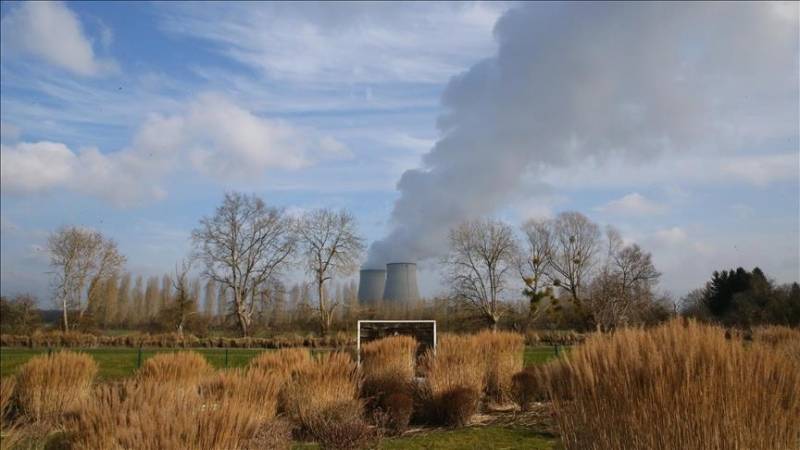Europe is struggling to address a deepening energy crisis partly due to the Russia-Ukraine war as Moscow has suspended natural gas supplies in response to economic sanctions imposed by the West.
Governments are trying to diversify energy supplies and introduce measures to reduce demand and save energy.
Germany
The energy crisis continues to concern Germany, with measures in some German states indicating how Europe's largest economy needs to save more electricity, according to local media Monday.
To save money during the energy crisis, restaurants in the German state of Baden-Wurttemberg are thinning out their menus or keeping their doors closed more often, local media said.
"Optimization is a permanent task. But economic pressure has increased, so opening hours, menus, or staff deployment are being questioned," Daniel Ohl, the spokesman for the Baden-Wurttemberg Hotel and Restaurant Association, told German press agency DPA.
As part of the measures, restaurants introduced additional days off or took dishes off the menu that were rarely ordered but created storage costs.
A little further north in Rhineland-Palatinate state, the city of Ludwigshafen, aiming to save around 150,000 kilowatt-hours of electricity amid the energy crisis, switched off street lighting even at the important traffic points Hochstrasse North and South.
"It is important that we as an administration set an example and conserve resources together with industry and the citizens," said Mayor Jutta Steinruck in a statement.
Saving energy with street lighting is an "ongoing process that has been consistently pursued for many years," the statement continued, adding every year, around 5% of energy is saved compared to the previous year.
In the very south of Germany, in Bavaria, Stadtsparkasse Augsburg bank is planning to lower room temperatures to save energy, which is mandatory since the German government's new energy-saving regulations came into force in September.
Due to the new temperature requirements, the bank is now also relaxing its traditionally strict dress code.
"The basic principle remains, of course, but it is softened in that we ask for understanding,” a spokeswoman told local media.
"But no one will be standing around in a ragged sweater at our facility," and hats and fleece jackets should remain taboo, even if the rooms are heated to 19 degrees Celsius (66 degrees Fahrenheit) and hallways and foyers remain completely unheated, added the spokeswoman.
Meanwhile, Germany's planned "price brakes" for electricity and gas will cost about €83 billion ($83.1 billion) in 2023, local media reported Monday.
The federal government's planned €200 billion in special funds to mitigate the effects of skyrocketing energy costs is supposed to last until 2024.
German press agency DPA reported that Finance Minister Christian Lindner is already earmarking more than half for next year. In addition, around €15 billion is said to have been budgeted for a stake in energy utility Uniper, which is in severe financial straits.
According to the economic plan, numerous relief measures that have already been decided, such as a heating cost subsidy and housing benefit reform, will come up with additional costs of €2.2 billion.
Added to this is another €2 billion for the decision not to allow the CO2 price to rise in the coming year.
Spain
Spain’s stock market regulator CNMV on Monday authorized Siemens Energy’s takeover bid for wind turbine manufacturer Siemens Gamesa.
Although the German company already owns a majority stake in the Spanish-founded company, it aims to take 100% control.
Purchasing the outstanding shares would just cost Siemens Energy slightly more than €4 billion.
On Monday, Siemens Gamesa’s share price opened at €17.94, and Siemens Energy has a bid to pay €18.05 per share.
Siemens Energy said Monday that if it achieves at least 75% of the capital, it will delist the company from the Spanish Stock Exchange. The company currently trades on Spain’s blue-chip index, the IBEX 35.
In May, when Siemens Energy initially launched the takeover bid, it pointed to Siemens Gamesa’s financial problems, such as below-expected profit and cash flow.
However, Siemens Energy said the takeover would boost profitability, predictability and earnings stability.
In a presentation to shareholders, Siemens Energy estimated that the global installed capacity in wind, excluding China, would nearly double from 500 gigawatts in 2021 to 950 gigawatts in 2030.
The German firm forecasts particularly strong growth in global offshore wind installations. In 2021, 3 gigawatts of capacity were added globally, excluding China, but by 2030, 27 gigawatts of new capacity are expected.
According to Siemens Energy, Siemens Gamesa is the market leader in offshore wind energy and the world’s third-largest company in onshore capacity.






